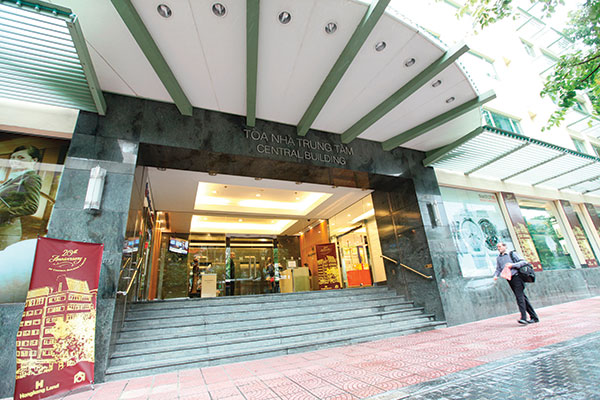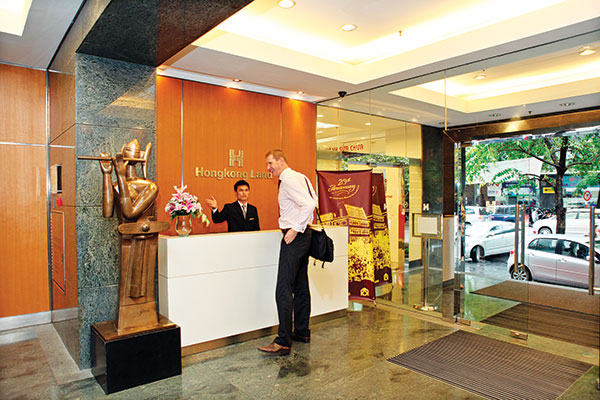Central Building Limited - 20 years of excellence

Two decades have now passed, but Central Building continues to maintain its status as a leading building for private enterprise and public sector tenants needing premium office space in Vietnam.
Central Building Limited this week marks its 20th anniversary with celebrations attended by business and community leaders, senior government officials and diplomats.
Completed in 1995 via a joint venture between Hongkong Land and its local partner, Kinh Do One Member Ltd. Co, an arm of the Hanoi Federation of Labour, the office building has consistently achieved a 95 per cent occupancy rate, and remains an outstanding example of a modern Vietnamese business centre.
The Finnish embassy was one of the building’s first tenants and has remained in place for close to two decades. Finnish Ambassador Kimmo Lahdevirta said that the embassy’s services depended upon high-quality and reliable building services.
“It’s been very easy to do business with Hongkong Land. The company is a very straightforward landlord and we have established a long-term partnership,” Lahdevirta said.

Hongkong Land’s conveniently-located Central Building development
The British embassy is another long-term anchor tenant. British Ambassador Dr. Antony Stokes congratulated Central Building Limited on its first 20 years and wished Hongkong Land and Kinh Do the very best for the future.
“The building management staff members are always cheerful and our embassy personnel enjoy interacting with them. I know they are very efficient because there is a lot involved in keeping a building like this running well. The commitment to good service and reliable operation allows us to focus on doing our job in the embassy,” said Stokes.
Central Building Limited general director Cao Ly Anh said the building’s prominent location has offered tenants unparalleled connectivity with major transport networks. Situated at the intersection of Hai Ba Trung and Ba Trieu streets, the building is just a few minutes away from Hoan Kiem lake, government offices, Hanoi Opera House and the legendary Sofitel Metropole Hanoi.
Central Building has a basement car park, retail outlets on the ground floor and six office floors. Housing the British, Finnish and South African embassies, the building is home to well-known multi-national enterprises and blue-chip companies. Service-oriented staff provide a smooth-running operation which gives tenants ease of mind to focus on their businesses.
“Thanks to the commitment and motivation of the building’s developers, managers and staff, Central Building has proved that joint ventures such as ours have the ability to meet the increasing expectations from the business sector, as Vietnam continues to expand its presence on the world stage,” said Ly Anh.
Following the success of Central Building, Hongkong Land completed 63 Ly Thai To in 1998, another grade A office tower located within Hanoi’s central business district, near Hanoi Opera House, in joint-venture with partner The Fatherland Front and Manolis & Company Asia Ltd.
Cosimo Jencks, Hongkong Land’s head of commercial property, Vietnam and Cambodia, said 63 Ly Thai To demonstrated an unwavering commitment to quality as part of the company’s ethos of tenant satisfaction, a key element in Hongkong Land’s success over more than a century of development.
“In the past 20 years, there have been other projects built in Hanoi, but Hongkong Land’s two complexes remain the benchmark for commercial buildings and the first choice for blue-chip tenants in the city,” he said.
Jencks said the buildings embodied Hongkong Land’s relationship with Vietnam’s authorities, investors and partners.
“Central Building is a key factor in Hongkong Land’s unique market position in the country, and long-term partnerships as well as our attention to business relationships have also contributed to its success over the past two decades in Vietnam,” he added.
“Hanoi has seen dramatic changes over the past 20 years and is now an important economic centre for Southeast Asia,” Jencks continued.
Jencks asserted that Hongkong Land would continue to focus on the country’s main hubs and was looking to expand into the residential property sector.
“Vietnam is an important part of our Southeast Asia strategy, given the success of our properties which have catered for international businesses and organisations. The country continues to grow and provides significant opportunities,” he said.
What the stars mean:
★ Poor ★ ★ Promising ★★★ Good ★★★★ Very good ★★★★★ Exceptional
Latest News
More News
- State corporations poised to drive 2026 growth (February 03, 2026 | 13:58)
- Why high-tech talent will define Vietnam’s growth (February 02, 2026 | 10:47)
- FMCG resilience amid varying storms (February 02, 2026 | 10:00)
- Customs reforms strengthen business confidence, support trade growth (February 01, 2026 | 08:20)
- Vietnam and US to launch sixth trade negotiation round (January 30, 2026 | 15:19)
- Digital publishing emerges as key growth driver in Vietnam (January 30, 2026 | 10:59)
- EVN signs key contract for Tri An hydropower expansion (January 30, 2026 | 10:57)
- Vietnam to lead trade growth in ASEAN (January 29, 2026 | 15:08)
- Carlsberg Vietnam delivers Lunar New Year support in central region (January 28, 2026 | 17:19)
- TikTok penalised $35,000 in Vietnam for consumer protection violations (January 28, 2026 | 17:15)
















 Mobile Version
Mobile Version